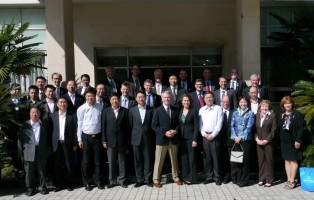By Tamara Schiff
Last week Governor Kitzhaber and 42 other state and private actors returned from an 11 day trade mission to Asia. Though two officials from the Port of Coos Bay accompanied Governor Kitzhaber on the trade mission, the visit included trips to China, Hong Kong, and Japan, but not South Korea, the potential market for coal and liquefied natural gas if export plans from the Port of Coos Bay are approved.
We can't help wondering why the Coos Bay officials felt the need to tag along on the lengthy trade mission—last week, the Port of Coos Bay asked Lane County not to vote on their resolution that would support the export of coal from Coos Bay, saying that there was no agreement in place, and therefore no point in considering a project that Board of Commissioners Chairman Sid Leiken said doesn't exist. This didn't stop more than twenty concerned citizens and organizations, including Cascadia Wildlands, for presenting arguments against the proposed coal export project, a disastrous plan that would harm the environment and threaten the health and safety of Oregonians.
Japan, China, and Hong Kong aren't interested in coal or LNG. They're hoping to import agricultural and sustainable products from Oregon. In particular, Asian markets want Oregon wine, pears, dairy products, and electric motorcycles. It's no wonder: As we've said before, the proposed coal export, aside from promising to accelerate climate change impacts, increase pollution to our air and waterways, and endanger the health and safety of citizens as coal travels through our neighborhoods on trains, is an economically unwise endeavor. The Powder River Basin coal that would be shipped to South Korea from Coos Bay is being sold at far lower prices than the fair market value; this amounts to a subsidy from U.S. taxpayers for Asian countries. Proponents of the coal export project point to the jobs it will create, but we think the job numbers and economic impacts set out by the Port of Coos Bay are inflated.
Exporting LNG to Asia is an equally treacherous endeavor. Fracking poses huge environmental risks here in the U.S., and the market for LNG in Asia is incredibly volatile—the consensus seems to be that there is no long-term Asian market for U.S. LNG.


Thanks for keeping on top of this. Here's hoping WE THE PEOPLE can take precedence over financial gain for the wealthy, and that the people in Coos Bay can create jobs with less toxic options (like wind power) instead of selling their souls for coal.